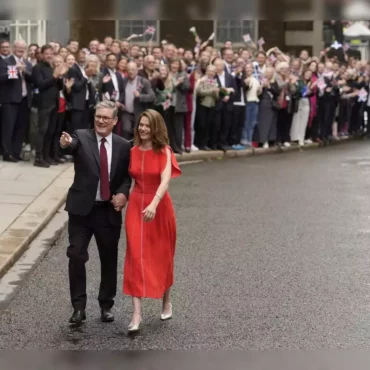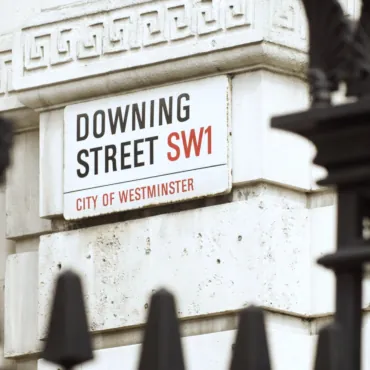The televised debate between the leaders of the two main parties, Rishi Sunak and Sir Keir Starmer, was not a sensation – it was only the first in a series of live election rivalries and is structured so that viewers in the studio ask the questions that voters care most about.
The debate was watched by 5.5 million viewers and according to a poll conducted by YouGov immediately after the broadcast, viewers favored premier Rishi Sunak in this round. But as the headline in the Spectator Weekly the next morning read – “Starmer wins the election, but the debate was won by Sunak.” The gap, however, is only 2% – not compared to the gap with which Labor is currently trailing – its pre-election rating is 20%, if not more, ahead of the Tory party.
A blow to conservatives
Moreover, the other day a sensational electoral analysis was published, according to which the Tories will suffer a crushing defeat: the Conservatives’ parliamentary faction may be reduced to 140 seats, while Labor is projected to win 422 seats. This would be a record majority that would allow them to easily form a government. Moreover, if the predictions come true, leading ministers of the current government, including Finance Minister Jeremy Hunt and Defense Minister Grant Shapps, could lose their mandates.
The unexpected appearance of the enfant terrible.
The real sensation was the unexpected return to the political arena of Nigel Farage, the first leader of the former UKIP party, which later became the Brexit party, the main architect of Britain’s exit from the EU. Contrary to claims that he would not run in this election, Farage suddenly announced that he had decided to run for Reform UK (formerly Brexit), which he immediately took over.
The emergence of the charismatic Farage at the head of a party that will draw away voters disaffected with Sunak who have voted Tory in the past from the Conservatives is a serious blow to Rishi Sunak and to his fading hopes of victory with each passing day. Farage has refused to get involved in the race and run for office until recently, citing his commitments to Trump, whom he is helping in his campaign in America. It is said that Rishi Sunak, while announcing the July election date, hoped that Farage, with his American commitments, would be caught unawares. The Tory leader, who is losing support for his party and the electorate by the day, realizes how dangerous this rebel is for him. It is already clear that this unexpected move by Farage has shaken up the electoral agenda and caused confusion in the Conservative ranks, and his promise to “lead a political revolt” and garner millions of votes, and to lead the right-wing opposition if Labor wins because “the Tories are on the verge of total collapse” are not empty words.
The Conservative party’s chances are melting before our eyes
Nigel Farage and his Reform UK party will pull votes away from the Tory party and actually help Labor. But most of all it will help Nigel Farage himself in his political career. It is likely that he is methinks that he is aiming for the Conservative Party leadership seat in the future. He is now standing as a candidate in the constituency represented by the Tory MP. Not only could Farage win the constituency, but the party he now leads could gain about a dozen seats in Parliament, displacing the Conservatives, according to new projections. If that happens, the Tory faction could shrink to 100 or fewer members, and Farage’s appearance in the House of Commons could explode an already directionless party from within. And eventually Farage may even lead the Tory party.
Najel Faraj is quite a popular figure: in all recent years, he has stayed off the television screens without participating in politics. Until recently he had his own program on GB News (now, having become a candidate, he is not allowed to work on air). In 2023, he participated in the most popular show I am Celebrity…Get Me Out Of Here. In that contest of endurance and lack of squeamishness, Farage did not win. He only came in 3rd place, but he demonstrated qualities that have always been useful to him and will surely be useful to him in his political career, such as the ability to eat a small edible dish without changing his facial expression (e.g., pizza with camel and sheep udders and cow teats).
But, of course, Nigel Farage can attract disillusioned voters not
with this. Farage’s tough stance on one of the sorest topics – immigration – sounds appealing to many Tory voters, although it is not yet clear how his populist promises to drastically cut illegal immigration and reduce the issuance of visas to new migrants can be fulfilled.
Back to the debate
The problem of illegal migrants, which all previous governments, including the Sunak government, have unsuccessfully tackled, was one of the topics in the first debate on ITV. Each of the debaters’ responses to the question of how they would address this problem showed a dramatically different approach to addressing this problem in particular. When asked by the moderator of the debate what they would do if the European Court of Human Rights ruled that the British government’s actions in the case of the expulsion of illegal migrants to Rwanda were illegal (this law was recently, passed), Rishi Sunak confidently replied that in such a case he would insist that Britain withdraw from the ECHR, while Keir Starmer just as confidently stated that he would obey the European court’s decision.
The first debate was tense, and given that the participants had only 45 seconds for each answer, at times it looked like ping-pong.
One of the few moments that drew laughter from the audience was when they were asked how they were going to solve the problems of the NHS. It’s no secret that the waiting list for elective surgery in England remains at the same monstrous level of under 8 million people. The audience laughed heartily (and bitterly) at Sunak’s claim that the line had shortened.
Interestingly, when asked if they would turn to private healthcare if a relative became seriously ill, Sunak confidently replied ‘yes’, Starmer ‘no’, saying he always only used NHS services.
Labour will take two thousand pounds out of the pocket of every working family. Truth or election scaremongering?
It is known that the topic of taxes is the one that people, and in the pre-election period the electorate, are most concerned about. No one wants the state to take away their honestly earned money. The Conservatives, who traditionally advocate tax cuts, although the same cannot be said of recent governments, are always scaring voters with Labor’s intentions to raise taxes. Not unreasonably so, judging by some of the Labor Party’s plans to raise VAT on private schools and the like. But Sunak’s claim that every working family would lose £2,000 a year if Labor won has caused an uproar. Starmer was confused during the debate and did not have time to respond, but the very next day the method of calculation that led to that figure was questioned not only by Labor supporters but also by some economists. The next day Sir Cyrus used an unparliamentary expression by calling Rishi Sunak a liar!
There’s a new televised debate ahead and judging by the new participants – it could be more lively. The next round of debates, which will take place as early as tomorrow (June 7) on the BBC, will feature the leaders of the seven major parties, including the newly minted leader of Reform UK, Nigel Farage. It won’t be boring.
